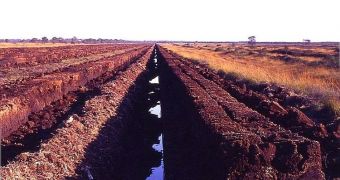A new study by geographers at the University of Leicester, in the United Kingdom, suggests that extreme weather events can promote the release of significant amounts of greenhouse gases from peatlands. This gives rise to a new vicious circle leading to climate change.
For this research, scientists defined extreme weather as including events such as record rainfalls, cold spells, massive storms and so on. Interestingly, these phenomena are promoted in increasing numbers by the changing climate.
Experts conducted most of the research in the East Anglian Fens, at a newly built monitoring station that was inaugurated this June. The installation is capable of conducting accurate measurements of the amount of carbon dioxide and methane released by drained and cultivated peatlands in the area.
The work was carried out by scientists at the University's Department of Geography, and the Center for Landscape and Climate Research. The research has not yet concluded, as the team plans to conduct long-term measurements of GHG emissions.
They are particularly interested in learning how various weather conditions are affecting carbon dioxide release patterns. The study is being carried out with support from the Natural Environment Research Council (NERC).
The English Fens are intensively farmed, which is why the peatland soils at this location are so degraded. The area is renowned as the largest source of carbon dioxide from land use in the UK.
“Preserving greenhouse gases that are stored in peat soils is being recognized more and more as a way to fight climate change. Extreme weather can change the amount of greenhouse gases being released from peat soils,” Heiko Balzter explains.
“At the same time, these emissions influence future climate itself. We have a feedback loop here, where cause and effect influence each other. Land managers and politicians are looking for solutions to the climate problem. We hope to be able to contribute to finding them,” the expert adds.
Balzter holds an appointment as a professor of physical geography at the University of Leicester, and is also the director of the Center for Landscape and Climate Research and Professor of Physical Geography.

 14 DAY TRIAL //
14 DAY TRIAL //